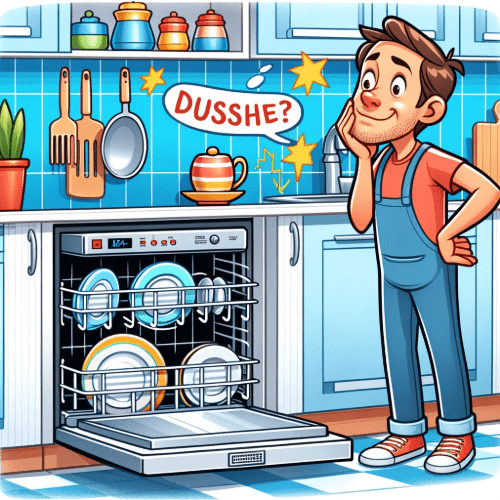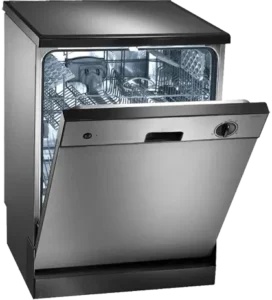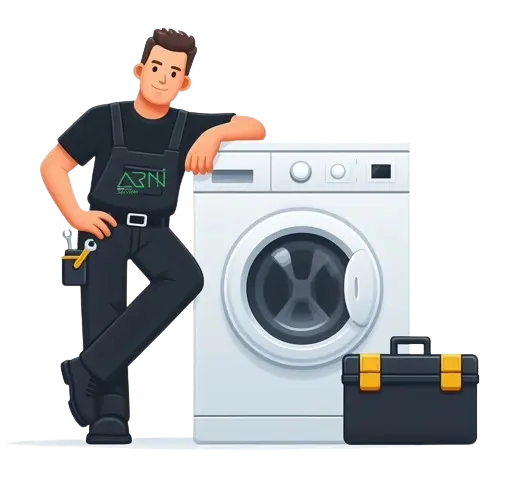Blog
Dealing with a noisy dishwasher in your home? It’s a common problem. A dishwasher making strange sounds can be annoying, especially in a busy household. In this guide, we’ll tackle how to quiet a noisy dishwasher. Fixing these sounds not only brings back peace to your kitchen but also ensures your dishwasher is working right.


If your dishwasher is really noisy, it could be for a few reasons. Sometimes things like small items or food bits get stuck and make noise when the dishwasher runs. Other times, parts inside might be loose or worn out. It’s important to check and clean inside your dishwasher to find what’s causing the noise. Fixing these things can solve your noisy dishwasher.
Buzzing is a common sound in dishwashers, often perceived as a low, continuous hum or vibration. It’s usually not a sign of a major problem, but it can be annoying. The causes of buzzing noises in dishwashers can vary from simple issues like loose objects to more complex mechanical problems.
To diagnose the cause of a buzzing noise, start by inspecting the interior of the dishwasher. Look for any visible objects or debris that might be causing an obstruction. Next, check for any loose components, such as screws or panels, and tighten them if necessary. If the noise persists, it might be time to check the motor and related components.
Preventing the noise: To prevent buzzing noises in the future, regular maintenance is key. This includes routinely cleaning the filter and spray arm, checking for loose parts during cleaning, and ensuring that small items are securely placed in the dishwasher or removed before starting a cycle.
Grinding noises in a dishwasher can be disconcerting, often sounding like a harsh grating or crunching. This noise can indicate something more serious than the typical dishwasher operation sounds and should be addressed promptly to avoid potential damage to the appliance.
To diagnose grinding noises, start by checking for visible obstructions. Empty the dishwasher and inspect the bottom, especially around the pump and grinder area. Look for any foreign objects or debris that might be causing the noise. If nothing is visible, the issue might be with worn-out internal components.
Preventing the noise Preventing grinding noises mainly involves proper use and maintenance of the dishwasher. This includes regularly cleaning the filter, checking for and removing any foreign objects after each cycle, and ensuring that dishes are loaded correctly. Additionally, periodic inspections of the internal components can help catch any wear or damage early, preventing the development of grinding noises.

We come to you, view all service location areas
Squealing noises in a dishwasher can be quite jarring, often sounding like a high-pitched shriek or squeak. This type of noise can indicate a problem with moving parts or internal components and should be addressed to ensure the longevity and proper function of the appliance.
Diagnosing squealing noises involves a careful inspection of the dishwasher’s motor, pump, and belt system (if applicable). Start by checking the motor and pump for any signs of wear or damage. If your dishwasher has a belt, inspect it for wear, proper tension, and alignment.
Fixing Squealing Noises
Preventing the noise: Regular maintenance is key to preventing squealing noises in your dishwasher. This includes routinely cleaning the filter and checking the motor, pump, and belt system for any signs of wear or damage. Ensuring that the dishwasher is loaded correctly and that the water inlet and drainage systems are clear can also help prevent issues that lead to squealing noises.
Thumping noises in a dishwasher can be disconcerting, typically sounding like a rhythmic knocking or banging during a wash cycle. This noise often suggests a mechanical interference or misalignment within the dishwasher, requiring attention to prevent potential damage.
To diagnose thumping noises, first, inspect the dishwasher’s interior for any improperly loaded dishes or utensils that might be obstructing the spray arm’s movement. Next, check for any loose, damaged, or misaligned components within the dishwasher.
Preventing the noise Preventing thumping noises largely involves proper loading and regular inspection of the dishwasher. Ensure that dishes do not protrude into the path of the spray arm and that all components are securely fitted. Regular checks for damage or wear on the spray arm and other internal components can help catch issues before they cause noise problems.
Beeping noises from a dishwasher often indicate a specific issue or alert from the machine. Unlike the mechanical sounds of grinding or thumping, beeping is typically related to the dishwasher’s electronic controls or sensors signaling an operational issue or a specific condition that needs attention.
Diagnosing Beeping Noises The first step is to ensure that the dishwasher door is properly closed and latched. Next, check if the dishwasher displays any error codes or lights that might indicate a specific issue. Refer to the user manual for guidance on interpreting these signals.
Addressing Beeping Noises
Preventative Measures Regular maintenance, including checking the door seal and latch for wear or damage, can prevent beeping related to door issues. Additionally, ensuring a stable power supply and avoiding interruptions during cycles can help reduce beeping incidents.
By understanding and addressing the causes of beeping noises in your dishwasher

While DIY approaches are great for minor issues, some dishwasher problems are best left to our specialists at ARNI Services. It’s important to recognize when expert assistance is necessary to ensure your appliance is handled safely and effectively.
At ARNI Services, we offer:
Choosing ARNI Services means you’ll receive a clear explanation of the problem, a transparent quote, and a professional repair process. We stand by our work with a guarantee, ensuring your dishwasher functions perfectly after our service.

If you have concerns about your appliance’s performance, contact the professionals at ARNI Services, Appliance Repair, for a thorough diagnosis and repair service. – you can’t put a price tag on peace of mind.